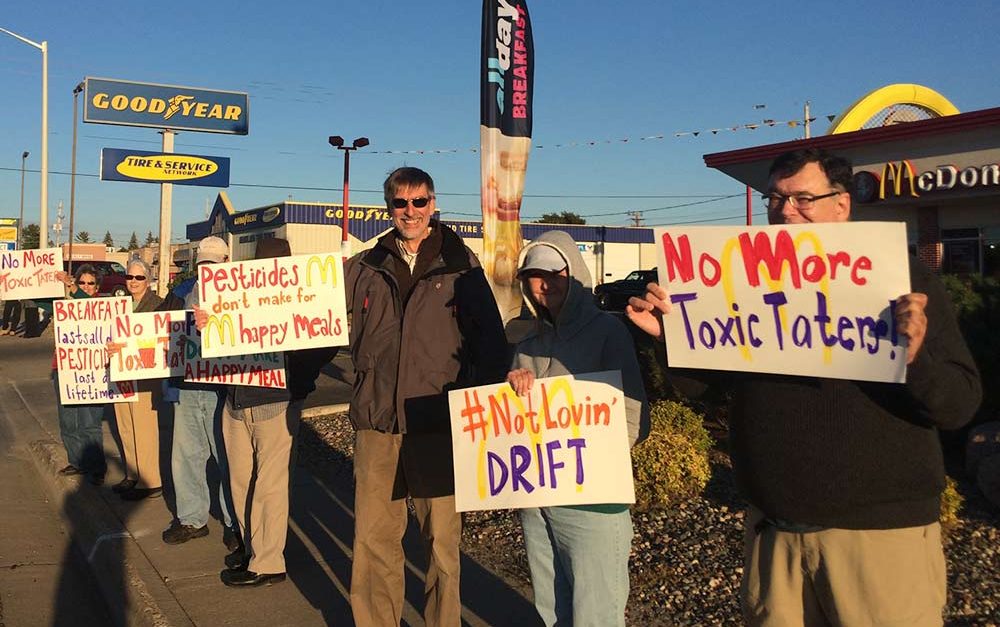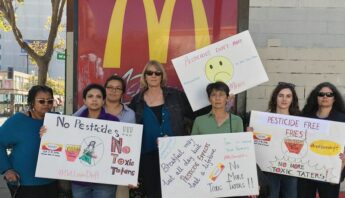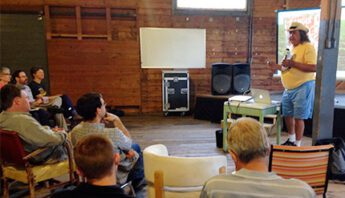Last Tuesday at lunchtime, I stood on the sidewalk outside a McDonald’s in St. Paul, facing the busy traffic on University Avenue with a colorful sign that said “Stop the Drift.” I was with a group of other supporters of the Toxic Taters Coalition: students, parents and community members who made time in their day to stand in solidarity with rural communities combatting pesticide drift.
“Hi there, do you have a second to hear about pesticides used to grow potatoes for McDonald’s?” I turned toward a woman walking by on her way to work. She stopped, interested, and took the flyer that I offered her. “A lot of the potatoes that McDonald’s buys are grown in northern Minnesota, and folks who live next to the potato fields up there are breathing hazardous chemicals in their air from the fields.”
She nodded slowly as she finished reading the flyer. “I didn’t know about this,” she exclaimed, surprised and a little indignant. “It’s not right,” she said firmly. As she walked away, she pulled out her cell phone to dial McDonald’s customer service phone number.
Actions coast to coast
I had a number of conversations like this last Tuesday. I talked with college students, McDonald’s employees on their way into work, and plenty of folks on their lunch breaks from retail and construction jobs on University Avenue. Many of the people I talked with were city folks who had never heard about pesticide drift before. But the issue came clear to them very quickly: no community should have harmful chemicals in their air. And when it comes to potato production, McDonald’s is in a position to do something about it.
Our letter delivery and demonstration in St. Paul was one of about 45 actions at McDonald’s stores across the country. These actions ran the gamut: from Hawai’i to New York to Ontario, passionate PAN and Toxic Taters supporters printed out letters for McDonald’s and delivered them to store managers. In communities near the potato fields — like Perham, Detroit Lakes and Park Rapids, Minnesota — Toxic Taters Coalition members held demonstrations outside local McDonald’s and talked with customers about the relationship between the french fries in the restaurants and the potato fields nearby. And then there were the Raging Grannies in Palo Alto, California, who delivered a letter and a full musical performance about the perils of pesticide drift.
Stephanie Porter is a staff member with the policy and organizing program of the Land Stewardship Project (LSP), one of PAN’s Minnesota partners and a powerful force organizing family farmers and rural communities for a just and sustainable food system. She coordinated an action in Brainerd, Minnesota — not too far from the area where RDO is clear-cutting pine forests and drilling new irrigation wells to expand its potato operations. Stephanie explained her motivations for joining the day of action:
I saw organizing an action as a way of pushing corporations like McDonald’s and RD Offutt to take responsibility for the damage they’re causing to people’s health and to the land in order to make a profit. I’ve talked to a lot of LSP members in the area who see something wrong with this picture, whether it’s the indiscriminate spraying of cancer-causing chemicals near people’s homes, or the depletion and contamination of our water … something needs to change.
No warm welcome
While McDonald’s customers and passers-by were interested in hearing from us, I can’t say the same for the fast food giant. At each action we organized, participants went inside the restaurant to deliver a letter to the manager. While some managers were polite and interested in the story of Toxic Taters, many others refused to accept our letter, or reprimanded participants for taking photos inside the store. It was clear that McDonald’s had sent a message to managers that they were to avoid engaging with us — at least, as much as they could.
Many people who couldn’t join an in-person action picked up the phone to call McDonald’s. They were met by a similar reaction from the company: a set of carefully-crafted talking points emphasizing McDonald’s commitment to reducing pesticide use. When I heard these talking points, I asked for more information — like real numbers demonstrating real reductions in pesticide use, or public information on the audit that McDonald’s has done with its potato growers. Unfortunately, I haven’t heard from anyone who got a straight answer when they asked questions like this.
McDonald’s response — in stores and on the phone — reminded me of the company’s unwillingness to hear from Toxic Taters members at its annual shareholder meeting in May. If the company is so proud of its potato suppliers, why are they afraid to share meaningful information about their practices?
Time for real commitments
Since our day of action last week, both McDonald’s and RDO have repeated their favorite talking points, insisting that they are already doing what’s needed to reduce pesticide use. Our actions have put them on the defensive, and they’re amplifying their messages.
I hope that both RDO and McDonald’s are reducing pesticide use, just as they say. But we’ve been clear about the four goals of our campaign, and public relations promises are not the same as real transparency or a clear long-term plan. Rural and Native communities are the ones on the frontlines, facing pesticide exposure year after year — and in the end, it’s up to them to decide when RDO and McDonald’s have truly gone far enough to reduce pesticide use. Until then, we’ve still got work to do. And, thanks to supporters across the country, momentum is building!
Take action » Want to stay up to date with the latest on the Toxic Taters Coalition’s work? Sign up here to keep in touch.








